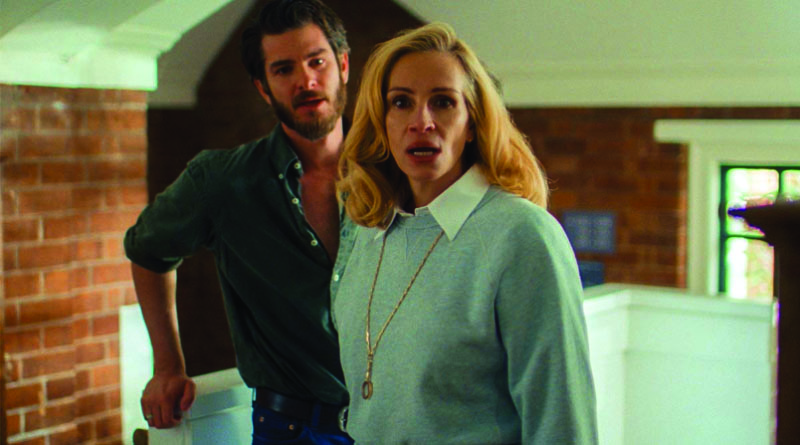In “After The Hunt,” Julia Roberts stars as Alma, a philosopher hoping to get tenure at Yale who has a friendly, flirtatious relationship to a fellow instructor, Hank (Andrew Garfield), though she is married to Frederik (Michael Stuhlbarg). From the beginning, some things are off. Hank squeezes the leg of Alma’s top student Maggie (Ayo Edebiri, from the FX show “The Bear”) and they go home together.
Maggie confides in Alma that Hank sexually assaulted her, but Hank tells Alma it isn’t true. Meanwhile Frederik, who appears to be Jewish, kind of accepts that his wife is busy in academia and he’ll have to bear her coming home late when he’s cooked. He is annoyed that they haven’t been intimate in some time.
At first, it appears that Maggie is telling the truth, and Hank is lying and hoping his friendship with Alma will bail him out. But as the film goes on it is not clear, and it may very well be that Maggie is telling the truth.
While there isn’t a lot of action in the film, Roberts and Garfield have great chemistry. Stuhlbarg, a Jewish actor best known for playing gambler Arnold Rothstein on “Boardwalk Empire,” is fantastic as a respectable man who you think should get more. Garfield has also identified as a Jew. Edebiri plays someone who is first self-deprecating and then a bit more sure of herself.
Directed by Luca Guadagnino, the film is a slow burn, and we don’t see what exactly happens between Hank and Maggie, though he admits he went into her apartment for a nightcap. Alert to all teachers/professors/assistant professors — you should never be alone in a room with a student, especially when alcohol is involved.
Maggie is accused of plagiarism by Hank, and the film doesn’t really coherently examine this. There is a big surprise near the end of the film that works well and an anticlimactic ending that doesn’t.
Garfield usually plays a good guy, so kudos to him for showing he can play a bad one. At the least, he’s arrogant and flirts with all his female students. Alma is repressing a lot, and it takes a physical toll on her that sends her to the hospital.
Everyone wants a happy marriage, but sadly that isn’t always the case, and it isn’t uncommon for one spouse to focus more on their career than their partner. When Frederik wonders if his wife truly loves him, Stuhlbarg delivers one of the most powerful lines in the movie.
The film’s title can be symbolic of many things, but one is the danger of tunnel vision: if we sacrifice a lot to get something, whether we get it or not, we may wind up feeling empty.
Roberts is underrated as an actress. Her performance shows a woman pretending she is sure of herself when that is not the case, as shown when she shouts at one of her students. I would have liked to have seen what Hank was like in the classroom; it would have made the film richer.
The four performances of Roberts, Garfield, Stuhlbarg and Edebiri carry the film. Edebiri has quickly risen to prominence; she has the acting chops to stand toe to toe with the iconic stars. This is because Edebiri excels as a conversational actress in the sense that she delivers most of her lines matter-of factly, with little pomp.
Despite a lukewarm ending, “After the Hunt” is a film that reminds us of the dangers of not keeping strict boundaries, and the ills that can come from thinking you know someone when it is possible they may be lying or hiding something important. We would all like to fight against the mundane rat-race of life, but as we are in it, we must play by the rules and know there are penalties for breaking them.




